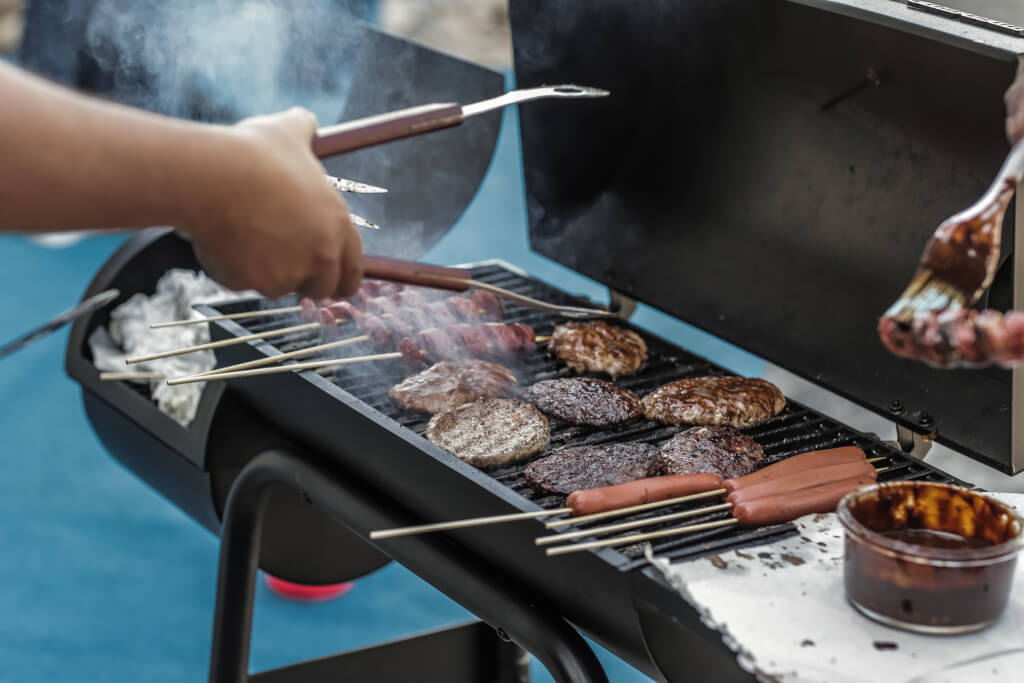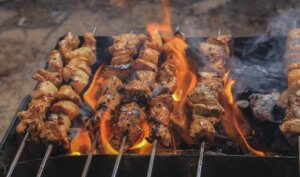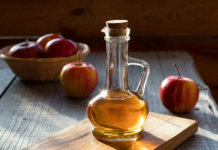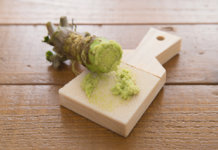While I’m sure many of you have already warmed up your grill this summer, the 4th of July always feels like the official kick-off to grilling and BBQ season.
But before you put your burger patties on the grill, there are a few keys to keeping yourself safe – and we’re not just talking about food safety. Over the years research has shown a potential link between grilled foods and increased risk of cancer.
This article will discuss what the research says about this link and ways to reduce your risk of carcinogens when grilling.
 Relationship between grilling and cancer risk
Relationship between grilling and cancer risk
Regardless of whether you’re cooking beef, pork, poultry or fish, there are two potentially cancer-forming compounds that can be created during grilling:
- Heterocyclic amines (HCAs): these chemicals are formed when meat is grilled over high heat (over 300˚F) or when meat is cooked for a long time.
- Polycyclic aromatic hydrocarbons (PAHs): these chemicals form when fat drippings from the meat fall onto an open flame, creating smoke. As the food continues to cook, the smoke transfers these PAHs directly onto the meat.
So how do these compounds possibly lead to cancer? While research is still ongoing, what’s been learned from animal studies is that both HCAs and PAHs can cause changes to DNA that could increase the risk of developing cancer.
Currently, there’s still a large gap in the literature on exactly how these chemicals affect the risk of cancer in humans and at what dosage.
However, many long-term studies have found that rats who were given HCAs in their diets went on to develop prostate, colon and breast cancer.
Additionally, studies looking at the exposure of rodents to PAHs have shown an increased risk for several types of cancer, including breast and lung cancers.
However, in these studies, the amount of PAHs and HCAs that the rodents were exposed to were very high – much higher than the dose a human would be exposed to from a grilled hamburger.
Human studies
So what about these chemicals in humans? Current guidelines on safe grilling are based off of observational studies that have shown that high intake of well-done, fried, and/or barbecued meats is associated with an increased risk of cancer (especially breast, colon, and prostate cancer).
However, it’s worth noting that other epidemiological studies have not found this relationship to be true, particularly once processed meats, like bacon and sausage, are removed from the equation.
So why is it so hard to tease out this relationship?
A big reason is that the amount of these chemicals formed varies greatly based on the type of meat being cooked, the temperature of the grill, and how long it’s cooked for. Additionally, its thought that different individuals metabolize these chemicals differently, so the risk of cancer likely varies by the individual.
Bottom line
While one charred chicken thigh or well-done steak is unlikely to significantly increase your cancer risk, eating these foods on a regular basis in addition to other lifestyle factors (such as smoking, exercise, and overall diet), could place you at increased cancer risk.
 How to reduce carcinogens when grilling
How to reduce carcinogens when grilling
The good news is that science has shown that there are ways to reduce the formation and exposure to these chemicals.
Tip 1: Reduce the fat
A 2016 study found that reducing the amount of smoke reduced by having less drippings hitting the open flames resulted in the most significant reduction of PAHs.
These drippings are fat from the meat dripping out and onto the open flame. So, to reduce the drippings, we need to decrease the amount of fat available to drip out and produce PAHs.
Lower fat, lean grilling options include:
- White fish
- Shrimp
- Skinless chicken breasts
- Ground turkey
- Sirloin or tenderloin steak
- 96% lean ground beef
- Pork chops or pork tenderloin
- Lamb loin
- Ground bison
Tip 2: Use marinades
While research is ongoing into why, studies have shown that marinating meats for at least 30 minutes prior to grilling significantly reduces the amount of PAHs found on the grilled meat.
Specifically, studies have shown that a combination of an acid (such as vinegar or lemon juice), oil, and herbs and/or spices are the most effective. For the oil, make sure to use one that does better with high heat, such as canola, avocado, or safflower oil.
Additionally, research out of Kansas State University suggests that including spices and herbs high in antioxidants in the marinade, such as turmeric, mint, rosemary, basil, thyme, oregano and thyme may further reduce the amount of PAHs.
It’s thought that the antioxidants in these herbs and spices can significantly decrease the levels of HCAs in your meat.
Tip 3: Grill, don’t burn
As the highest concentration of HCAs are found in burnt, charred sections, to reduce your exposure to HCAs it’s important to cook your meat just until it’s cooked through and then remove from the heat. This includes avoiding well-done steaks.
If you’re feeling extra cautious, you can also cut away any burnt spots.
Tip 4: Avoid long cooking times
While it’s important to cook your meat to the proper internal temperature for food safety reasons, research has shown that the longer meat is cooked, it’s more likely to have higher levels of PAHs and HCAs.
To help with this, try to cook smaller portion sizes of meat. Kebabs are ideal as they cook quickly and are usually marinated. However, you can still cook steaks, chicken breasts, and burgers, just try to keep the size or thickness lower so that they cook faster.
How to keep grilling healthy
Of course reducing these potentially cancer-forming compounds is just one key to healthy grilling.
Whether you’re trying to watch your weight or reduce risk of chronic disease, here are a few other essential tips for healthier grilling this summer:
- Don’t forget the vegetables! As important as protein is, vegetables provide numerous essential vitamins and minerals as well as disease-fighting antioxidants. Another bonus? Vegetables provide a lot of volume for much fewer calories.
- Use a meat thermometer. We’ve all heard tips and tricks for testing the doneness of our meat. However to avoid potentially undercooking your meat or losing moisture by cutting into it, a meat thermometer is a simple, accurate way to assess how much longer your turkey burgers need on the grill. Not sure what a safe internal temperature is for what you’ll be grilling? The USDA has a great chart for reference
- Don’t use raw utensils on cooked food. It may sound obvious, but when you’re multitasking with cooking and talking to your guests, it can be easy to use the same tongs that you used to put the meat on the grill to then take the cooked meat off the grill. Whether it’s using red tongs for raw and black tongs for cooked or immediately swapping them out after the meat is placed on the grill, find what works for you.
- Don’t leave food sitting out for too long. This is especially important for side dishes like pasta salad and even salsa, which are perfect breeding grounds for bacteria. To avoid getting yourself and others sick, try not to leave any food sitting out for more than two hours. If it’s a really hot day, it’s best to keep food in the shade or even inside your house where it’s less likely to spoil quickly.
Grilling can be a fun and delicious way to cook. And as long as you keep these tips in mind it can also be a healthy option.







